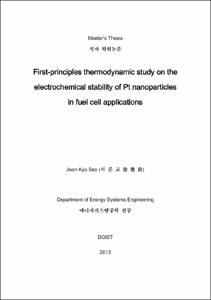First-principles thermodynamic study on the electrochemical stability of Pt nanoparticles in fuel cell applications
- Title
- First-principles thermodynamic study on the electrochemical stability of Pt nanoparticles in fuel cell applications
- Alternative Title
- 제일원리전산을 이용한 연료전지용 백금 나노촉매의 전기화학적 안정성에 대한 열역학적 분석
- Author(s)
- Seo, Joon Kyo
- DGIST Authors
- Seo, Joon Kyo ; Han, Byung Chan
- Advisor
- Han, Byung Chan
- Co-Advisor(s)
- Yoon, Young Gi
- Issued Date
- 2013
- Awarded Date
- 2013. 2
- Type
- Thesis
- Subject
- Density functional theory ; Fuel cell ; Nanocatalyst ; Stability ; Degradation mechanism ; 제일원리전산 ; 연료전지 ; 나노입자 ; 내구성 ; 열화메커니즘
- Abstract
- Durability of Pt based nanocatalyst materials in acidic environments is one of the key issues hindering the development of efficient fuel cells. In this study, we used first principles calculations to analyze the electrochemical degradation of Pt nanoparticles. Model systems for Pt nanoparticles of different sizes were conceptualized for calculating their electrochemical dissolution potential, which essentially indicates the nanoparticle’s resistance to dissolution. We adopted a step by step mechanism for dissolution of Pt atoms on the outermost shell of the nanoparticle by accounting for various possible pathways which lead to complete dissolution. Based strictly on thermodynamic considerations, our findings point towards a strong size dependent behavior of the Pt nanoparticles, whose properties become similar to bulk Pt for size more than 3 nm. Remarkably, we find that for all cases, the dissolution proceeds by exposing more (111) facets at the expense of other atomic sites. Our results indicate that the competition between two major thermodynamic factors, the cohesive energy and the surface energy, decides the dissolution pathway. Based on our findings, we propose some desired characteristics which can serve towards rational design of model Pt nanocatalysts. Our findings may be of importance in understanding of the electrochemical stability in other applications as well, for instance the photo-catalysts for fuel generations via water splitting. ⓒ 2013 DGIST
- Table Of Contents
-
Chapter 1. Introduction 1
--
1.1 Challenges of fuel cells 1
--
1.2 Objectives of this work 2
--
Chapter 2. Methodology 4
--
2.1 Model systems 4
--
2.2 Computational details 7
--
2.3 Formalisms 8
--
Chapter 3. Results and discussion 10
--
Chapter 4. Limitations of the thesis and future works 17
--
Chapter 5. Conclusions 19
--
References 21
--
Summary (국문요약) 25
- URI
-
http://dgist.dcollection.net/jsp/common/DcLoOrgPer.jsp?sItemId=000002262498
http://hdl.handle.net/20.500.11750/1327
- Degree
- Master
- Department
- Energy Systems Engineering
- Publisher
- DGIST
- Files in This Item:
-
 기타 데이터 / 1.21 MB / Adobe PDF
download
기타 데이터 / 1.21 MB / Adobe PDF
download
- Appears in Collections:
- Department of Energy Science and Engineering Theses Master



